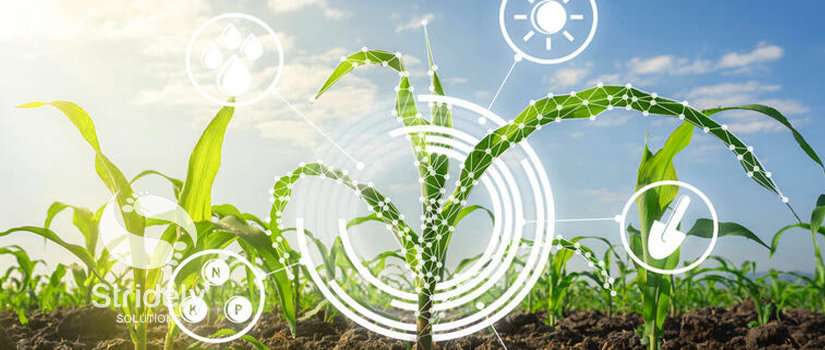Agriculture is undergoing a technological revolution, driven by the integration of Artificial Intelligence (AI). Precision farming, or precision agriculture, leverages AI to optimize crop yields, reduce waste, and promote sustainable farming practices. By harnessing data and advanced analytics, farmers can make more informed decisions, leading to increased efficiency and productivity. This blog delves into how AI is transforming precision farming techniques, highlighting its key benefits and applications.
One of the core aspects of precision farming is the use of AI-powered sensors and IoT devices to collect real-time data from the field. These sensors measure various parameters, such as soil moisture, temperature, nutrient levels, and plant health. AI algorithms analyze this data to provide actionable insights, enabling farmers to tailor their practices to the specific needs of their crops. For example, soil sensors can detect nutrient deficiencies and recommend the precise amount and type of fertilizer required, minimizing waste and environmental impact.
Drones equipped with AI and computer vision technology are revolutionizing crop monitoring. These drones can capture high-resolution images of fields, which AI algorithms then analyze to identify issues such as pest infestations, disease outbreaks, and water stress. This aerial surveillance allows farmers to detect problems early and apply targeted treatments, reducing the need for widespread pesticide use and improving crop health. For instance, AI-driven drones can identify areas of a field affected by pests and direct pest control measures specifically to those areas, rather than applying chemicals across the entire field.
Predictive analytics is another powerful tool in AI-driven precision farming. By analyzing historical data and current conditions, AI models can forecast future crop performance and weather patterns. These predictions help farmers plan their planting and harvesting schedules more effectively. For example, AI can predict the optimal planting time based on weather forecasts and soil conditions, ensuring that crops have the best chance of thriving. Similarly, yield prediction models can estimate the quantity of produce expected, aiding in inventory management and market planning.
Automated machinery is also benefiting from AI integration, leading to more precise and efficient farming operations. AI-powered tractors and harvesters can navigate fields autonomously, performing tasks such as planting, weeding, and harvesting with high precision. These machines use GPS technology, sensors, and machine learning algorithms to operate accurately and avoid obstacles. This automation not only reduces labor costs but also ensures that tasks are performed consistently and accurately. For example, AI-driven planters can plant seeds at the exact depth and spacing needed for optimal growth, improving crop uniformity and yield.
AI is also enhancing the management of water resources in agriculture. Precision irrigation systems use AI to analyze soil moisture data and weather forecasts, determining the optimal amount and timing of irrigation. This approach conserves water and prevents over-irrigation, which can lead to soil degradation and nutrient leaching. For instance, AI-driven irrigation systems can adjust water delivery based on real-time soil moisture levels, ensuring that crops receive the right amount of water at the right time. This precision reduces water usage and promotes sustainable farming practices.
In livestock farming, AI is being used to monitor and manage animal health and welfare. Wearable devices equipped with sensors track vital signs, movement, and behavior of livestock. AI algorithms analyze this data to detect signs of illness, stress, or abnormal behavior, allowing farmers to intervene early and provide appropriate care. For example, AI can identify changes in a cow’s activity patterns that may indicate health issues, enabling timely veterinary intervention and reducing the risk of disease spread.
Supply chain optimization is another area where AI is making a significant impact in agriculture. AI-powered platforms analyze market trends, demand patterns, and logistical data to optimize the distribution of agricultural products. This helps farmers align their production with market demand, reducing waste and ensuring that fresh produce reaches consumers in a timely manner. For example, AI can predict market demand for specific crops and recommend adjustments to planting schedules to match supply with anticipated demand, improving profitability and reducing food waste.
While the benefits of AI in precision farming are clear, several challenges must be addressed to ensure its widespread adoption. The high cost of AI technologies and the need for significant investment in infrastructure can be a barrier for small and medium-sized farms. Additionally, the complexity of AI systems requires technical expertise that may not be readily available in rural areas. To overcome these challenges, governments and agricultural organizations can provide support through subsidies, training programs, and partnerships with technology providers.
Data privacy and security are also critical considerations in the use of AI in agriculture. The collection and analysis of vast amounts of data raise concerns about data ownership and the potential misuse of sensitive information. Establishing robust data governance frameworks and ensuring transparency in data practices are essential to building trust among farmers and other stakeholders.
Despite these challenges, the potential of AI in precision farming is immense. As technology continues to advance, AI-driven solutions will become more accessible and affordable, enabling farmers of all sizes to benefit from precision agriculture. Collaborative efforts between the agricultural industry, technology providers, and policymakers will be crucial in driving the adoption of AI and ensuring its positive impact on global food security and sustainability.
AI is transforming precision farming by providing farmers with the tools to optimize crop yields, reduce waste, and promote sustainable practices. From real-time data collection and predictive analytics to automated machinery and precision irrigation, AI is revolutionizing agricultural practices and paving the way for a more efficient and sustainable future. As the agricultural industry continues to embrace AI, the benefits will extend beyond productivity gains, contributing to environmental conservation and global food security.
From Our Editorial Team
Our Editorial team comprises of over 15 highly motivated bunch of individuals, who work tirelessly to get the most sought after curated content for our subscribers.


